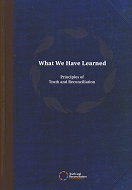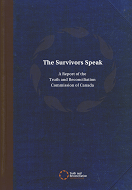Reports
Table of Contents
- Highlighted Reports
- Truth and Reconciliation Commission Reports
- National Centre for Truth and Reconciliation Reports
- Modern Reports
- Government Reports
- Legislation
- Aboriginal Healing Foundation Reports
Highlighted Reports
We would like to bring these reports to the country’s attention as there is more work to be done and more children to be found to honour and protect them.
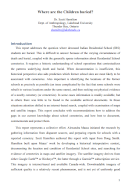
Where are the Children Buried? (PDF)
Dr. Scott Hamilton, Dept. of Anthropology, Lakehead University, Thunder Bay, Ontario shamilto@lakeheadu.ca
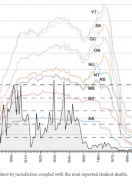
Where are the Children Buried? Figures and Illustrations (PDF)
Figures and illustrations accompanying Dr. Scott Hamilton's report "Where are the Children Buried?"
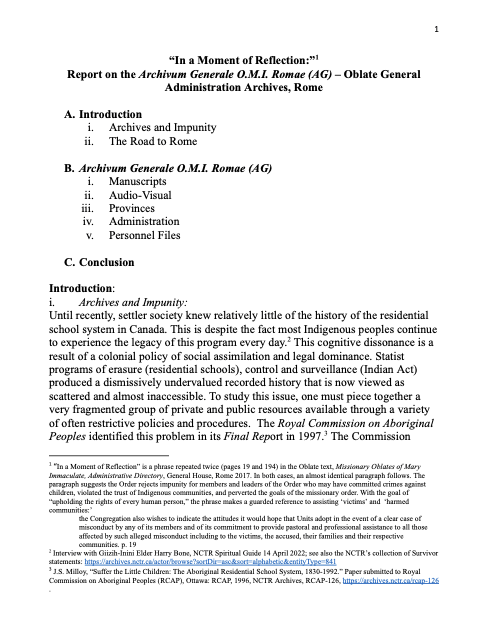
“In a Moment of Reflection:”1 (PDF)
Report on the Archivum Generale O.M.I. Romae (AG) – Oblate General Administration Archives, Rome
Truth and Reconciliation Commission Reports
Reports listed here were issued or created by the Truth and Reconciliation Commission of Canada (TRC). These digital copies can be accessed or duplicated at no charge from the NCTR’s website. All reports are in the public domain.
Full print copies of the TRC reports can be purchased from McGill-Queen’s University Press. At this time, the NCTR does not offer print copies for sale.
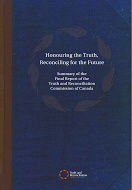
Honouring the Truth, Reconciling for the Future (PDF)
2015
Summary of the final report of the Truth and Reconciliation of Canada.
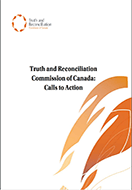
Truth and Reconciliation Commission of Canada: Calls to Action (PDF)
2015
In order to redress the legacy of residential schools and advance the process of Canadian reconciliation, the Truth and Reconciliation Commission makes 94 calls to action.
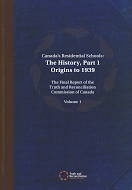
Canada’s Residential Schools: The History, Part 1 Origins to 1939 (PDF)
2015
The Final Report of the Truth and Reconciliation Commission of Canada Volume 1.
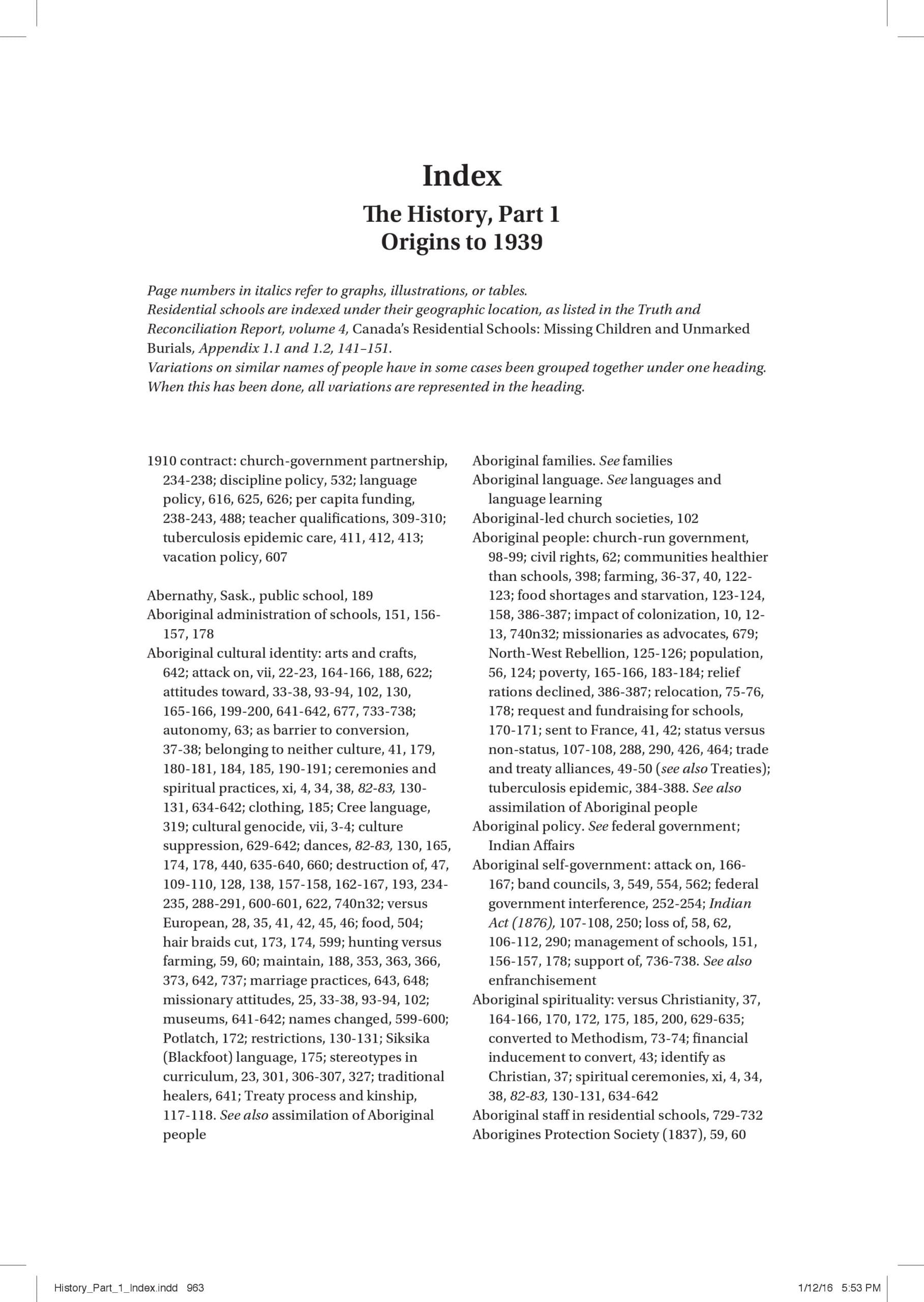
Canada’s Residential Schools: The History, Part 1 Origins to 1939 (PDF)
2015
Index for: The Final Report of the Truth and Reconciliation Commission of Canada Volume 1.
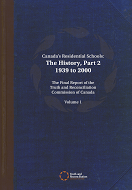
Canada’s Residential Schools: The History, Part 2: 1939 to 2000 (PDF)
2015
The Final Report of the Truth and Reconciliation Commission of Canada Volume 1.
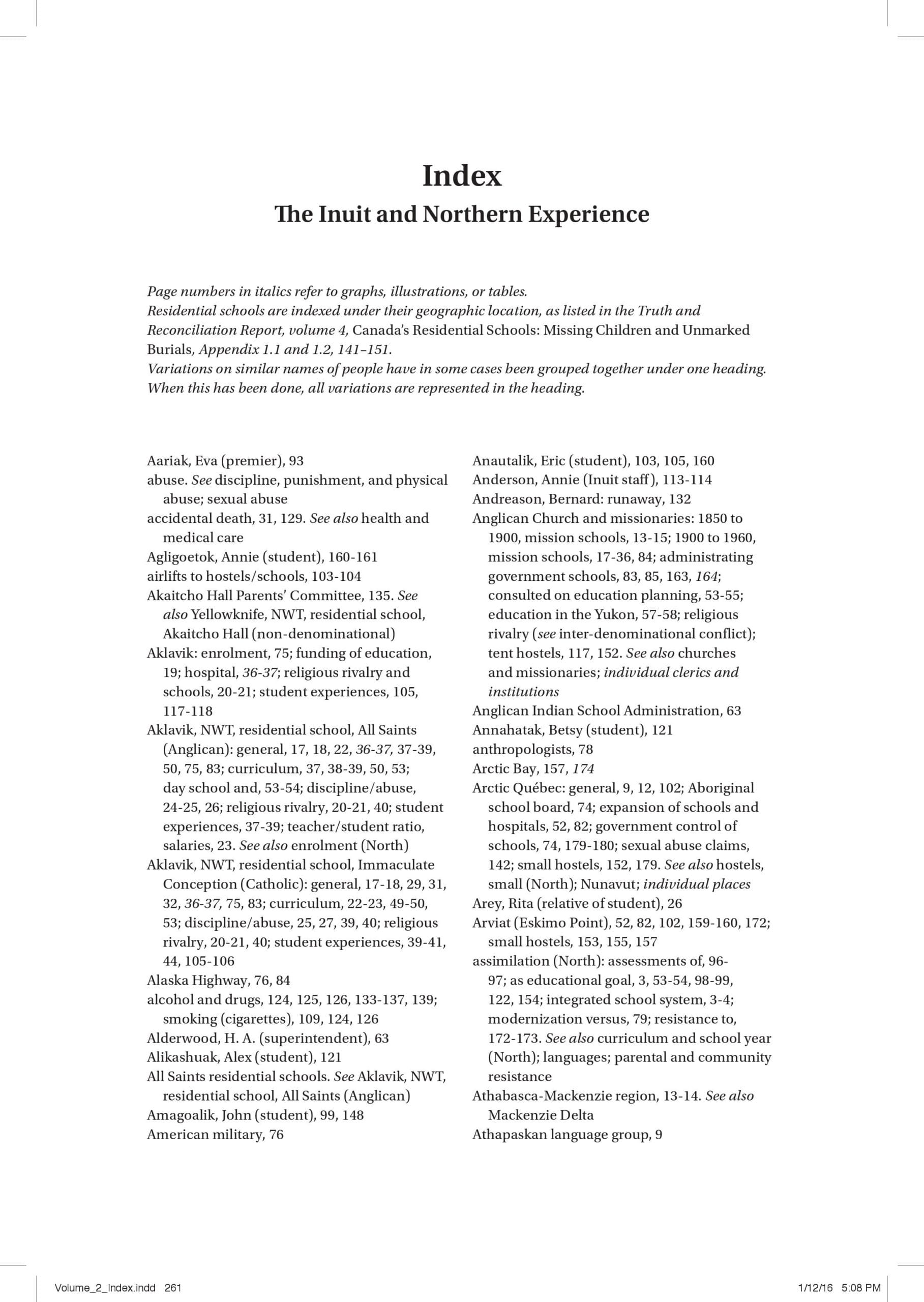
Canada’s Residential Schools: The History, Part 2: 1939 to 2000 (PDF)
2015
Index for: The Final Report of the Truth and Reconciliation Commission of Canada Volume 1.
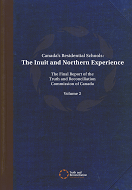
Canada’s Residential Schools: The Inuit and Northern Experience (PDF)
2015
The Final Report of the Truth and Reconciliation Commission of Canada Volume 2.
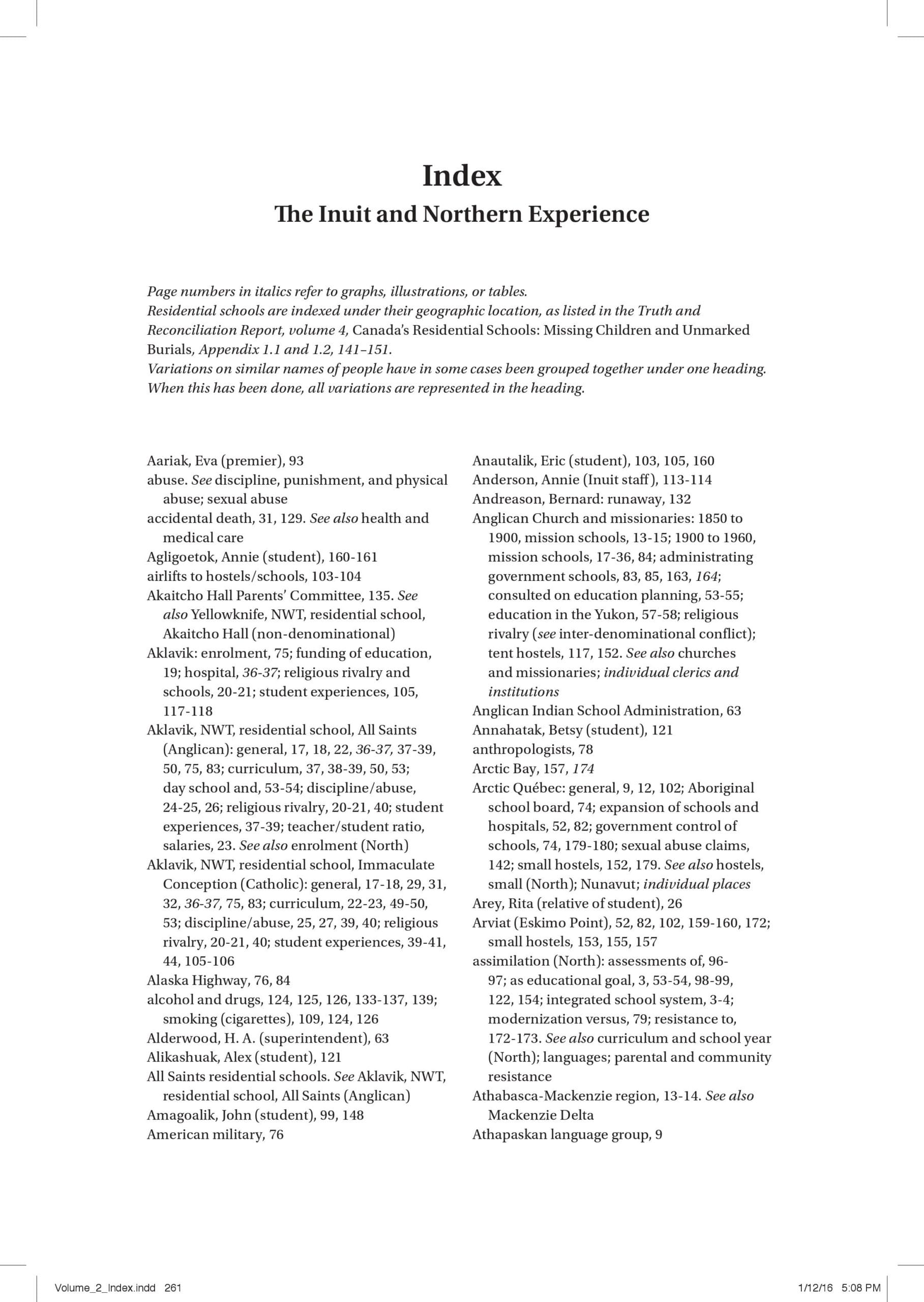
Canada’s Residential Schools: The Inuit and Northern Experience (PDF)
2016
Index for: The Final Report of the Truth and Reconciliation Commission of Canada Volume 2.
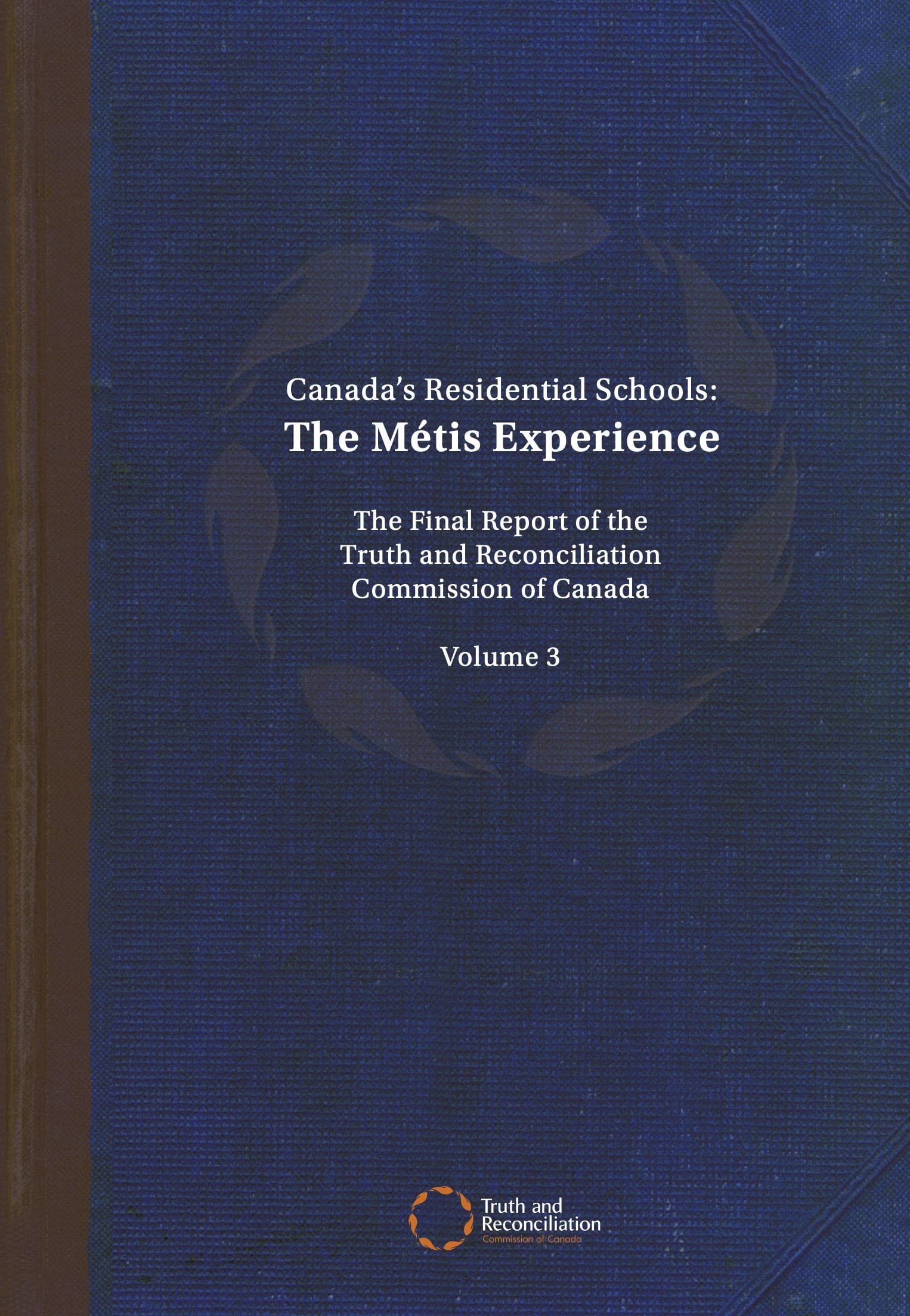
Canada’s Residential Schools: The Métis Experience (PDF)
2016
The Final Report of the Truth and Reconciliation Commission of Canada Volume 3.
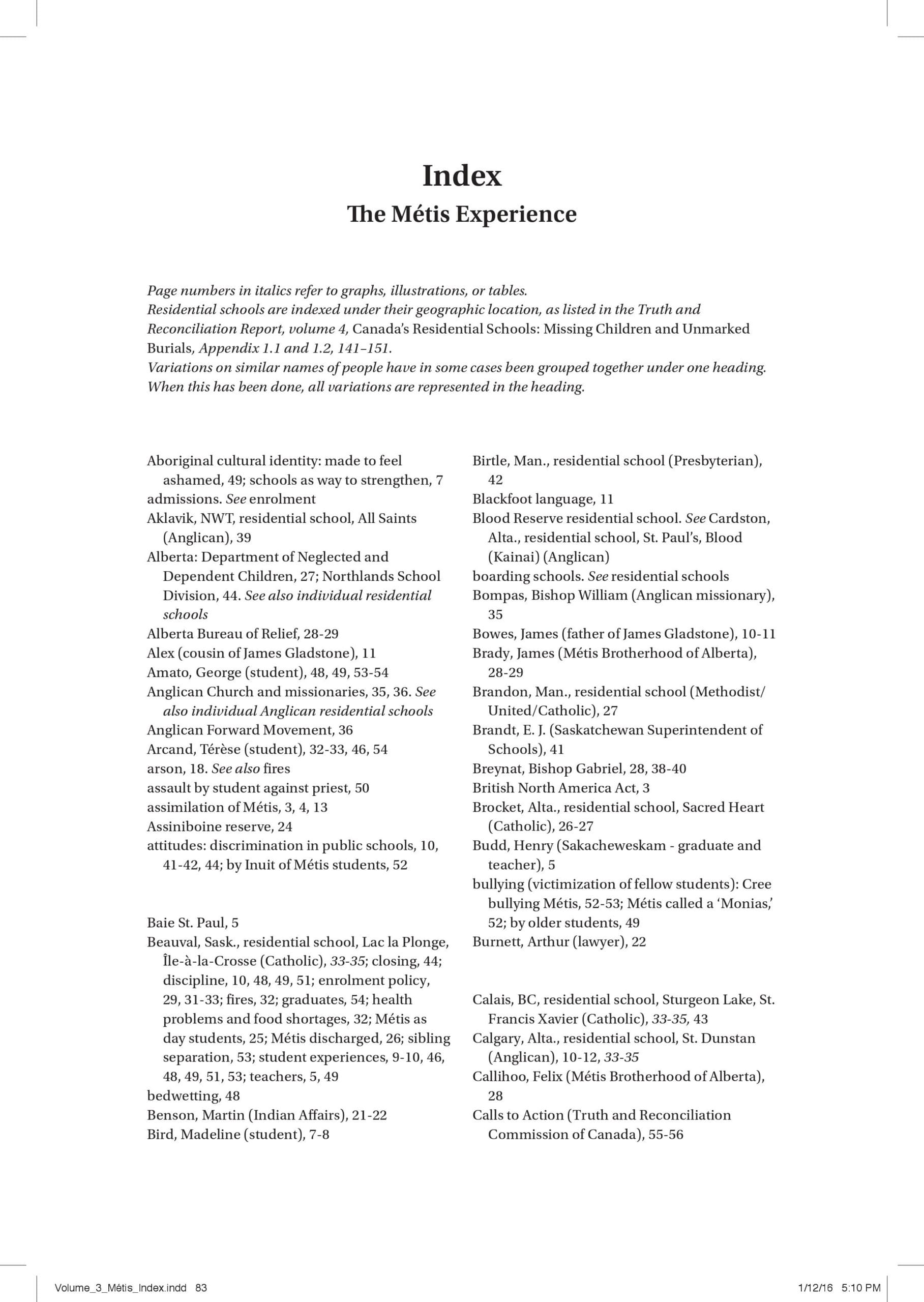
Canada’s Residential Schools: The Métis Experience (PDF)
2016
Index for: The Final Report of the Truth and Reconciliation Commission of Canada Volume 3.
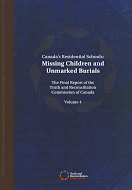
Canada’s Residential Schools: Missing Children and Unmarked Burials (PDF)
2016
The Final Report of the Truth and Reconciliation Commission of Canada Volume 4.
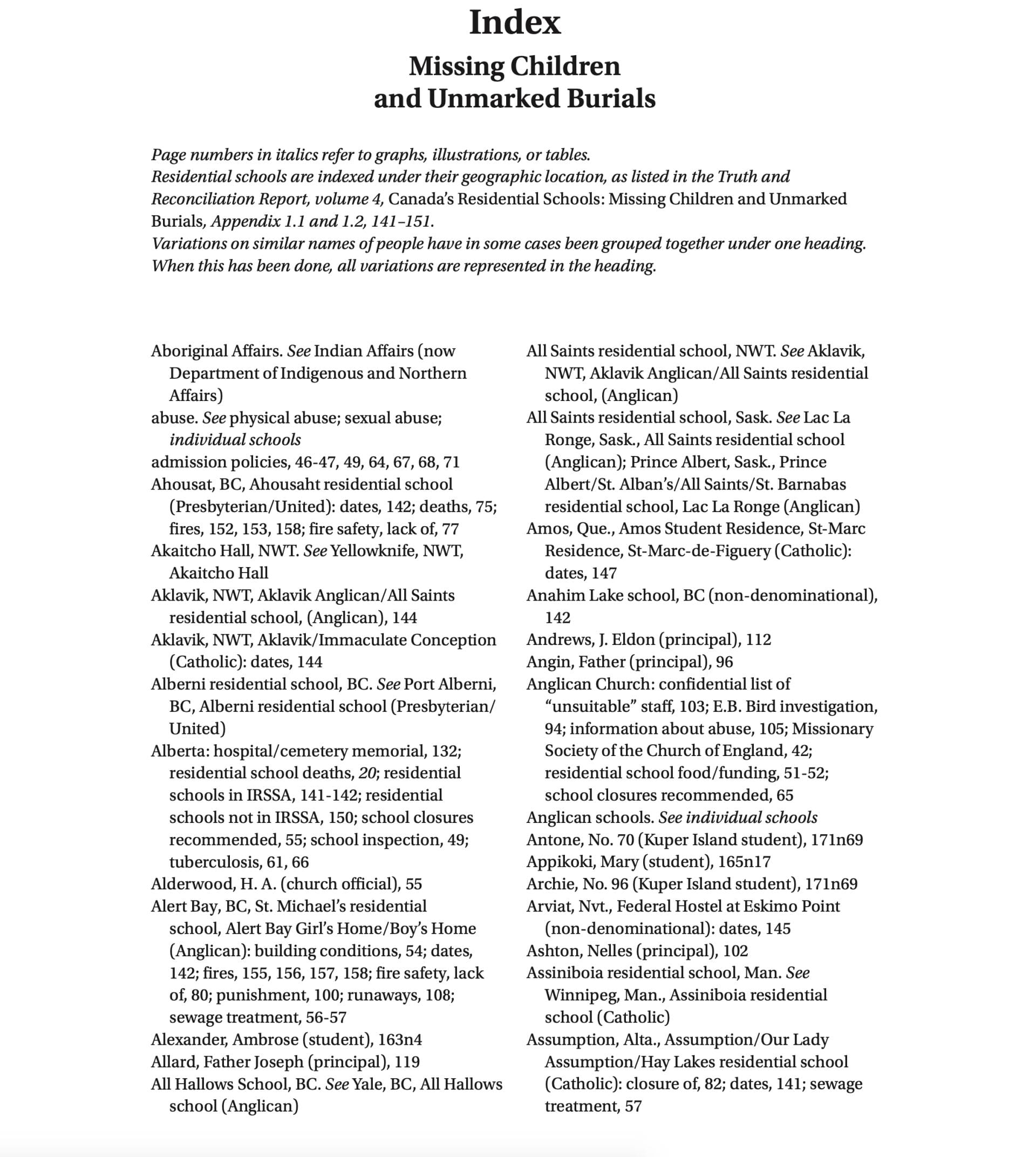
Canada’s Residential Schools: Missing Children and Unmarked Burials (PDF)
2016
Index for: The Final Report of the Truth and Reconciliation Commission of Canada Volume 4.
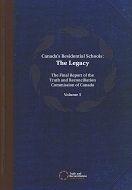
Canada’s Residential Schools: The Legacy (PDF)
2015
The Final Report of the Truth and Reconciliation Commission of Canada Volume 5.
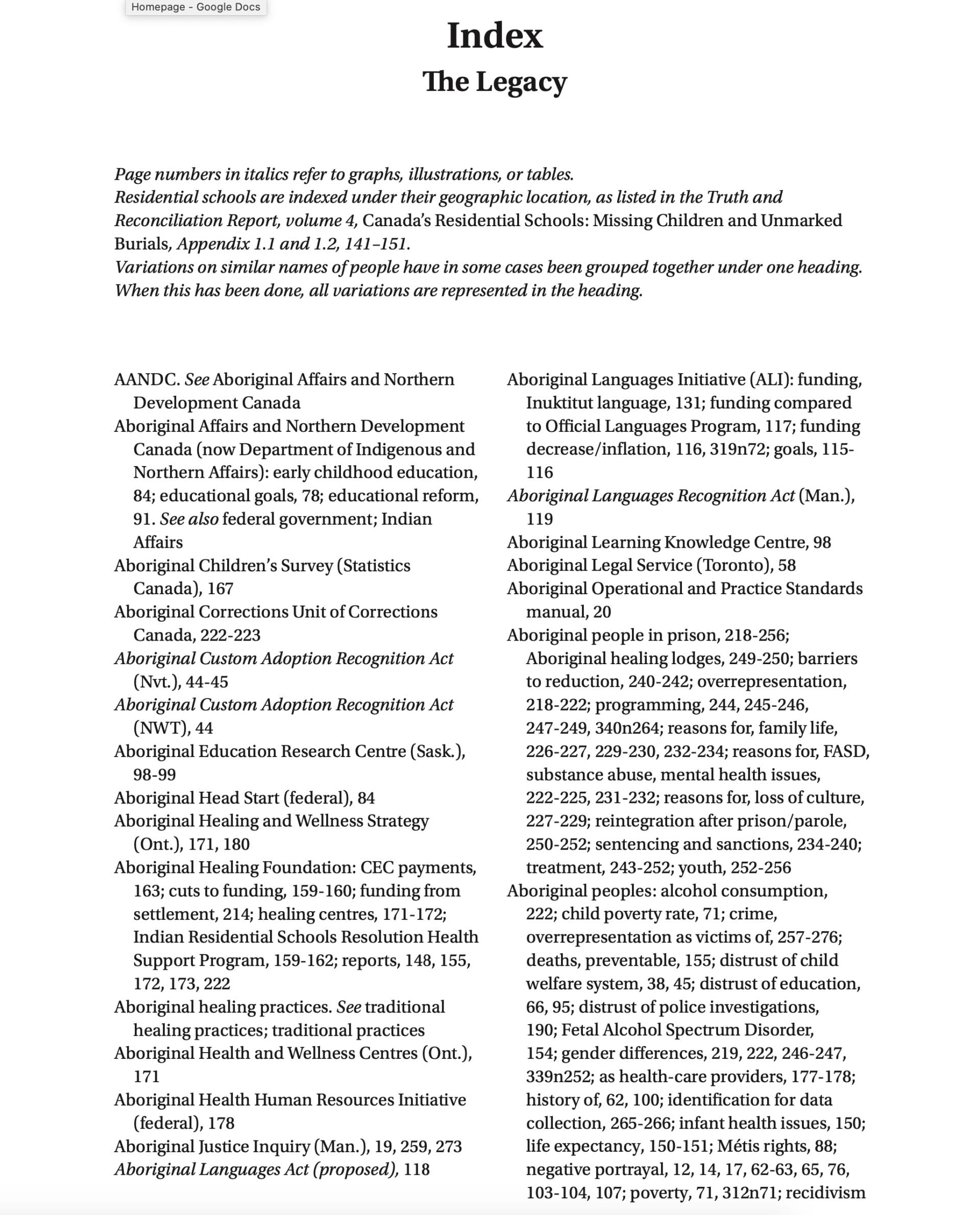
Canada’s Residential Schools: The Legacy (PDF)
2015
Index for: The Final Report of the Truth and Reconciliation Commission of Canada Volume 5.
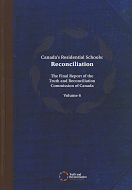
Canada’s Residential Schools: Reconciliation (PDF)
2015
The Final Report of the Truth and Reconciliation Commission of Canada Volume 6.
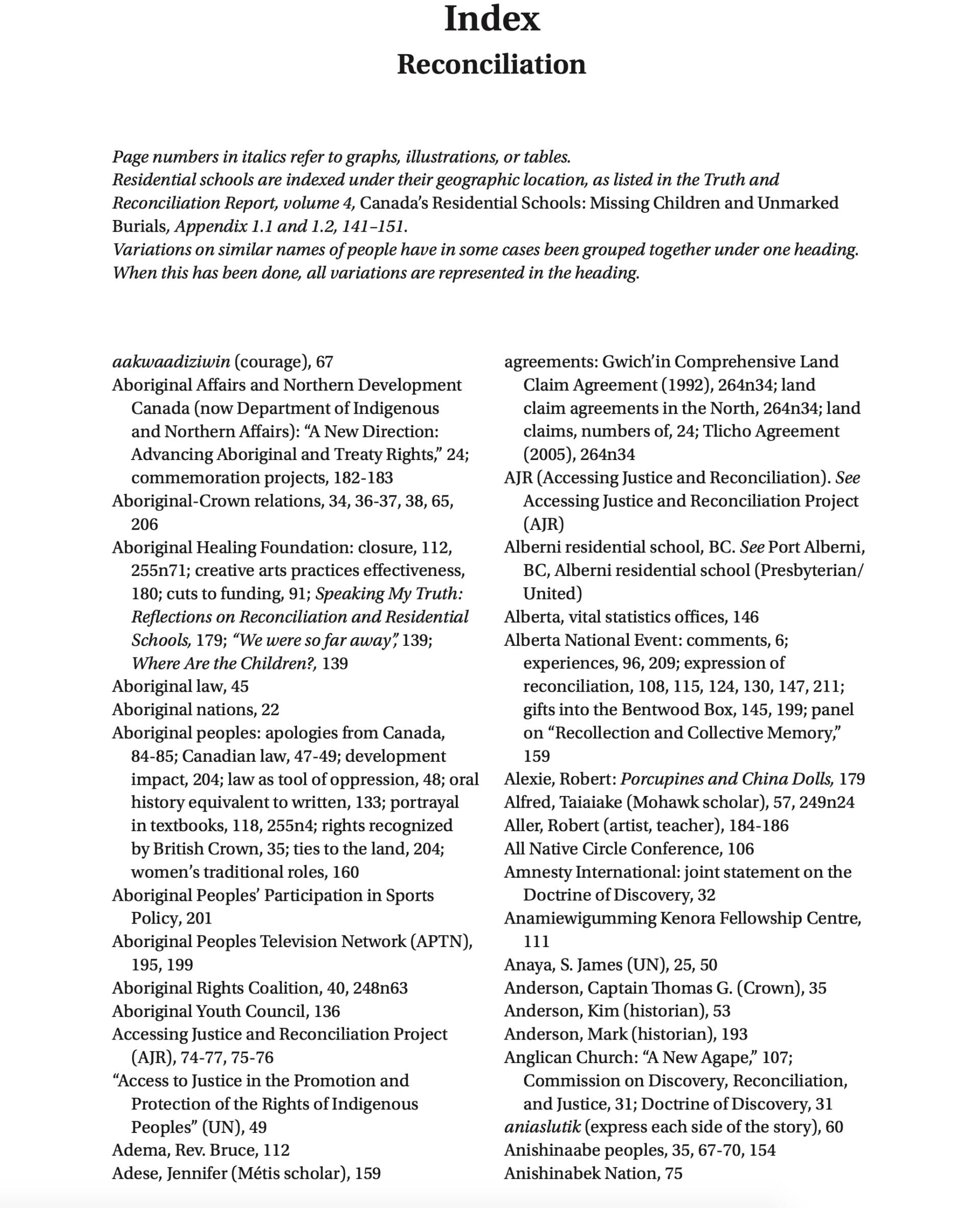
Canada’s Residential Schools: Reconciliation (PDF)
2015
Index for: The Final Report of the Truth and Reconciliation Commission of Canada Volume 6.
National Centre for Truth and Reconciliation Reports
Reports listed here were issued or created by the National Centre for Truth and Reconciliation.

The 2024 NCTR Annual Report (PDF)
The National Centre for Truth and Reconciliation's annual report for 2024.
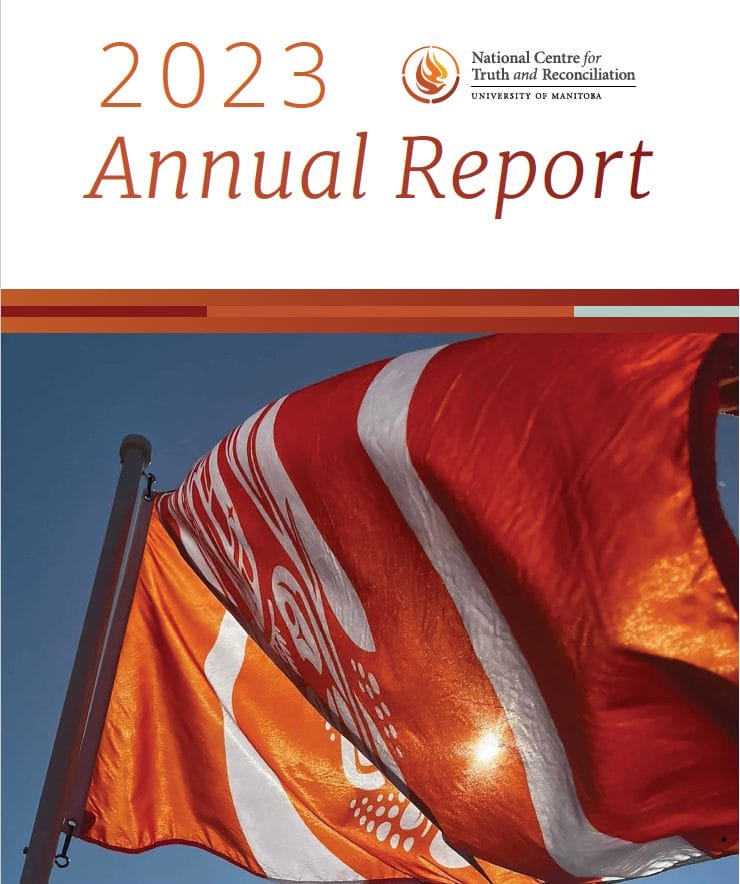
The 2023 NCTR Annual Report (PDF)
The National Centre for Truth and Reconciliation's annual report for 2023.

The 2022 NCTR Annual Report (PDF)
The National Centre for Truth and Reconciliation's annual report for 2022.
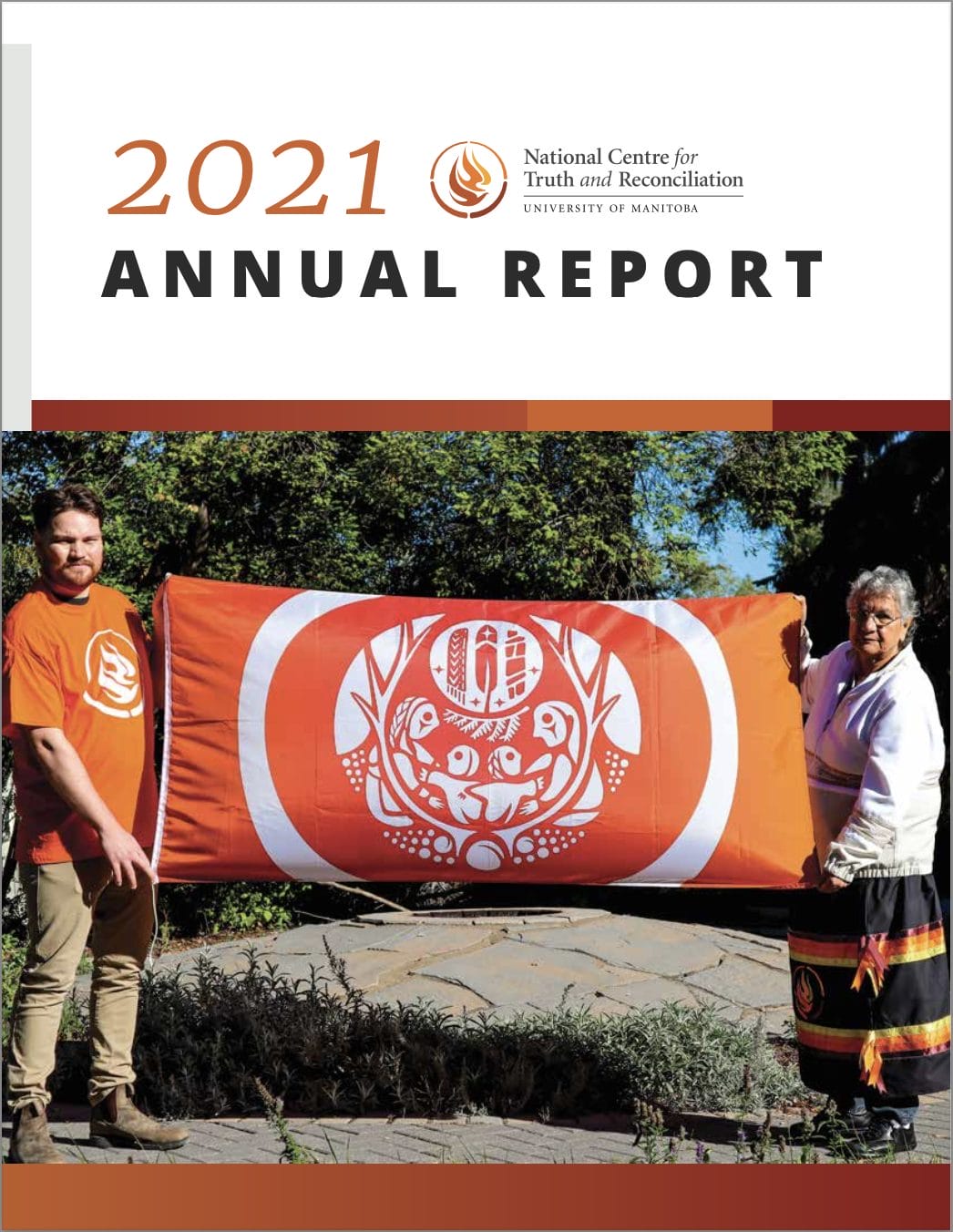
The 2021 NCTR Annual Report (PDF)
The National Centre for Truth and Reconciliation's annual report for 2021.
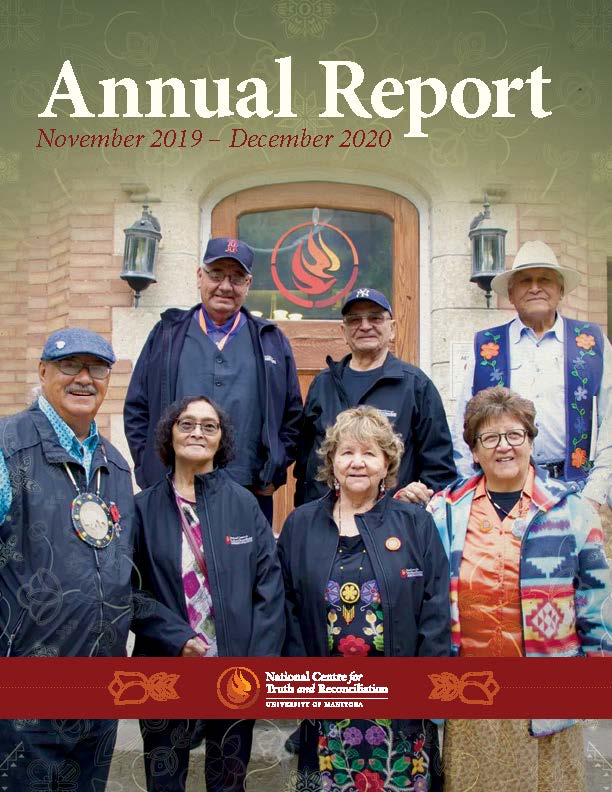
The 2019-2020 NCTR Annual Report (PDF)
2019-2020
The National Centre for Truth and Reconciliation's annual report for November 2019 to December 2020.
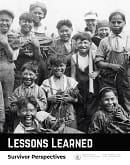
Lessons Learned Survivors Perspectives (PDF)
2020
A report on the Survivors experiences and Lessons Learned related to the Indian Residential Schools Settlement Agreement.
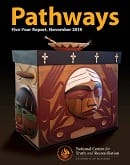
Pathways (PDF)
2014-2019
Pathways The National Centre for Truth and Reconciliation's Five-Year Report for 2014 to 2019.
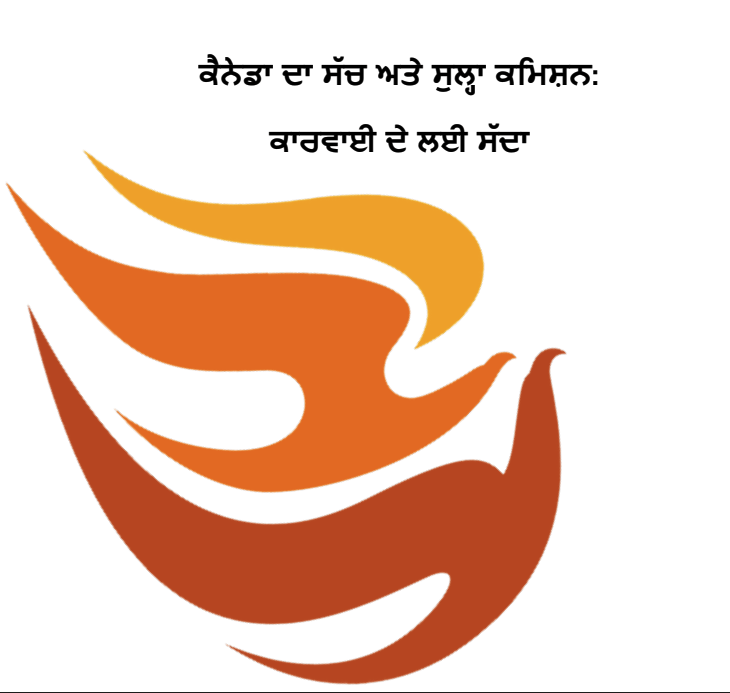
TRC's 94 Calls to Action transcribed in Punjabi (PDF)
The purpose of this document is to inform the Canadian Punjabi community about the history & legacy of residential schools and how the Punjabi community can support Canada's indigenous community in Calls to Action.
CREATING AN ENGAGEMENT PLAN WITH INDIGENOUS COMMUNITIES:
Considerations and approaches to develop relationships with Indigenous peoples, communities and Nations about the future use or protection of former Residential School Sites and/or buildings.
This report by the National Centre for Truth and Reconciliation was prepared for Indigenous Services Canada in 2023. Indigenous Services Canada conducted an environmental scan study as part of a broader effort to understand the current status, jurisdictional ownership and condition of sites and buildings associated with the 140 former residential school recognized in the Indian Residential Schools Settlement Agreement. Indigenous Services Canada prepared a narrative report and an interactive mapping tool which can be accessed through its departmental web site.
The CREATING AN ENGAGEMENT PLAN WITH INDIGENOUS COMMUNITIES report is meant to compliment ISC’s environmental scan by offering guidance for decisions concerning the future of former Indian residential school sites and buildings to ensure decision-makers account for the wishes of communities and Survivors.
This work is separate from the National Centre for Truth and Reconciliation’s priority to implement Call to Action #73 Memorial Register – NCTR
- Build an information repository for the National Residential School Cemetery Register.
- Analyze information relating to missing children and student deaths at former Indian Residential Schools and the presence and condition of cemeteries.
- Create a map of cemeteries and burial sites.
Modern Reports
Reports listed here are relevant and important reports issued in recent years related to the Residential School system.
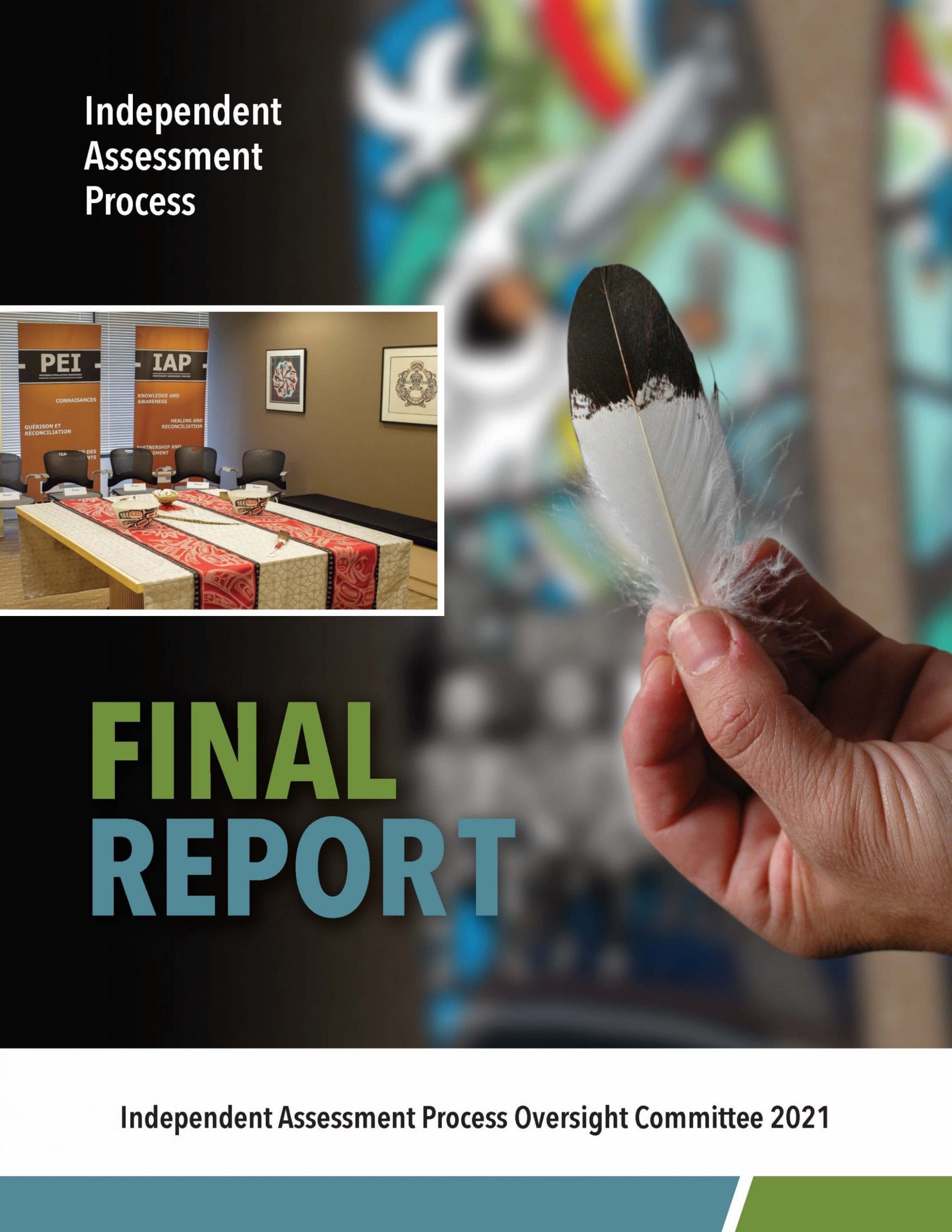
Independent Assessment Process Final Report (PDF)
2021
Issued by the Independent Assessment Process (IAP) Oversight Committee.
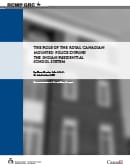
The Role of the RCMP During the Indian Residential School System (PDF)
2011
Composed of intenal RCMP research, this report documents some aspects of its involvement in the Indian Residential School system.
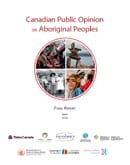
Canadian Public Opinion on Aboriginal Peoples (PDF)
2016
A national survey of non-Aboriginal Canadians.
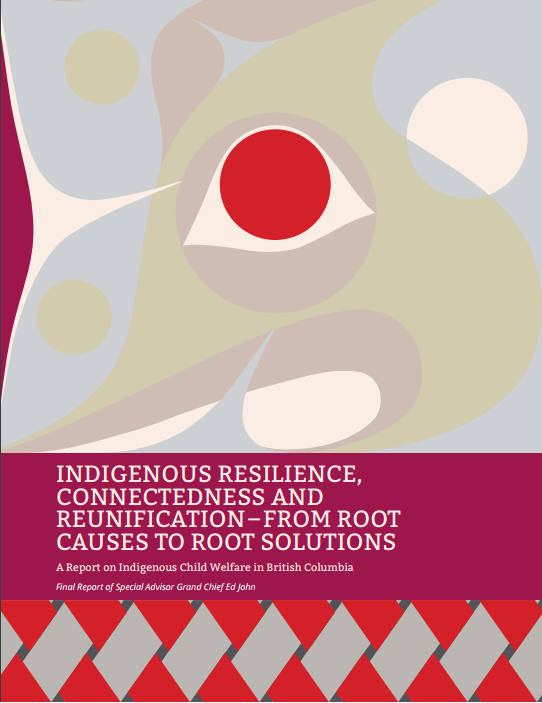
Indigenous Resilence, Connectedness and Reunification (PDF)
2016
A Report on Indigenous Child Welfare in British Columbia.
Government Reports
Reports listed here are central historical reports related to the Residential School system.
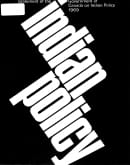
White Paper (PDF)
1969
Issued in 1969, this white paper advocated the assimilation of Indigenous people in Canada.

Ryerson Report (PDF)
1847
Report by Chief Superintendent of Education in Upper Canada, Egerton Ryerson, advocating the use of Industrial schools for educating Indigenous children.
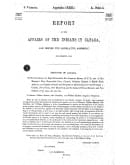
Bagot report (PDF)
1844
Governor General Sir Charles Bagot makes a range of recommendations, including the creation of boarding schools.
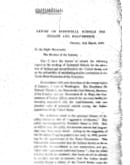
Davin Report (PDF)
1879
Commissioned by Prime Minister Sir John A. Macdonald, recommendations in this report led to the creation of government funded Industrial schools in Canada.
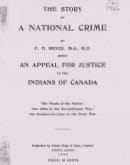
The Story of A National Crime (PDF)
1922
Working for the federal government, Peter Bryce repeatedly reported that tuberculosis and poor conditions in residential schools were decimating Aboriginal populations.
Legislation
Reports listed here were created by the Canadian Government regarding First Nations, Métis and Inuit peoples.
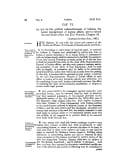
1869 Gradual Enfranchisement Act (PDF)
1869
A number of pieces of legislation, including the Gradual Civilization Act (1857) and Gradual Enfranchisement Act (1869) were consolidated in the Indian Act of 1876.
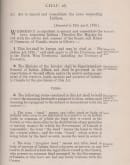
1876 Indian Act (PDF)
1876
The Indian Act of 1876 consolidated a number of pieces of legislation, including the Gradual Civilization Act (1857) and Gradual Enfranchisement Act (1869).
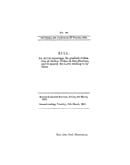
1857 Gradual Civilization Act (PDF)
1857
Act of Parliament that sought to assimilate Indigenous people through enfranchisment.
Aboriginal Healing Foundation Reports
We gratefully acknowledge the Legacy of Hope Foundation for granting access to the Aboriginal Healing Foundation publications. Visit https://ahf2.ca/ to order hard copies.
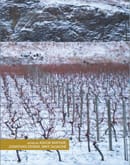
Cultivating Canada: Reconciliation through the Lens of Cultural Diversity (PDF)
The final volume in a series published by the AHF as it prepared to close its doors, this volume is the AHF's final word in terms of its research agenda.
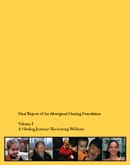
AHF Final Report: Volume 1 (A Healing Journey: Reclaiming Wellness) (PDF)
The final report and summary of the Aboriginal Healing Foundation.
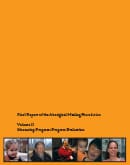
Volume 2 (Measuring Progress: Program Evaluation) (PDF)
The final report and summary of the Aboriginal Healing Foundation.
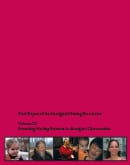
Volume 3 (Promising Healing Practices in Aboriginal Communities) (PDF)
The final report and summary of the Aboriginal Healing Foundation.
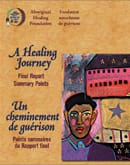
Final Report Summary (PDF)
The final report and summary of the Aboriginal Healing Foundation.
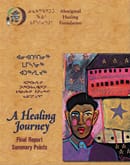
Final Report in Inuktitut (PDF)
The final report and summary of the Aboriginal Healing Foundation.
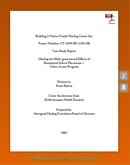
AHF Case Studies (PDF)
Thirteen case studies conducted through the AHF as part of their impact evaluation process.
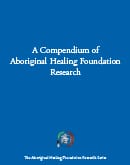
A Compendium of Aboriginal Healing Foundation Research (PDF)
A compilation of major research initiatives undertaken by experts in various fields on behalf of the AHF.
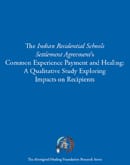
The Indian Residential Schools Settlement Agreement's Common Experience Payment and Healing: A Qualitative Study Exploring Impacts on Recipients (PDF)
This study reports on how the common experience payment has impacted Survivors and their healing.
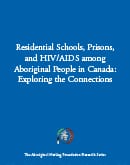
Residential Schools, Prisons, and HIV/AIDS among Aboriginal People in Canada: Exploring the Connections (PDF)
This report considers the unique set of needs Aboriginal people may have as a part of the legacy of the Residential Schools era, and particularly relating to HIV/AIDS.
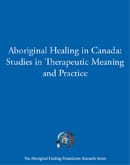
Aboriginal Healing in Canada: Studies in Therapeutic Meaning and Practice (PDF)
This report considers the unique needs Aboriginal people may have as a part of the legacy of the Residential Schools era, and particularly relating to HIV/AIDS.

Response, Responsibility and Renewal: Canada's Truth and Reconciliation Journey (PDF)
The second volume of a two-volume set this volume contains reflections on the opportunities truth and reconciliation process.
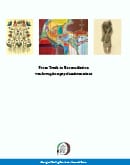
From Truth to Reconciliation : Transforming the Legacy of Residential Schools (PDF)
This work brings together a diverse group of authors who all reflect on the questions, challenges, and opportunities reconciliation raises.
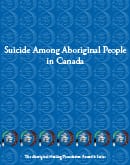
Suicide Among Aboriginal People in Canada (PDF)
This report looks at the complex issues that surround Aboriginal suicide in Canada.
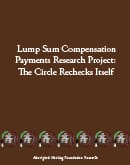
Lump Sum Compensation Payments Study (PDF)
This report looks at the issues that arise or are exacerbated as a result of lump sum financial payments to survivors.
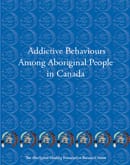
Addictive Behaviours Among Aboriginal People in Canada (PDF)
This report explores addictive behaviours by positioning them in the context of Aboriginal history and culture.
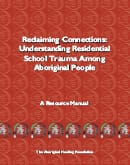
Reclaiming Connections: Understanding Residential School Trauma Among Aboriginal People (PDF)
Reclaiming Connections is an manual intended to help in understand the experience of residential school trauma for Aboriginal people.
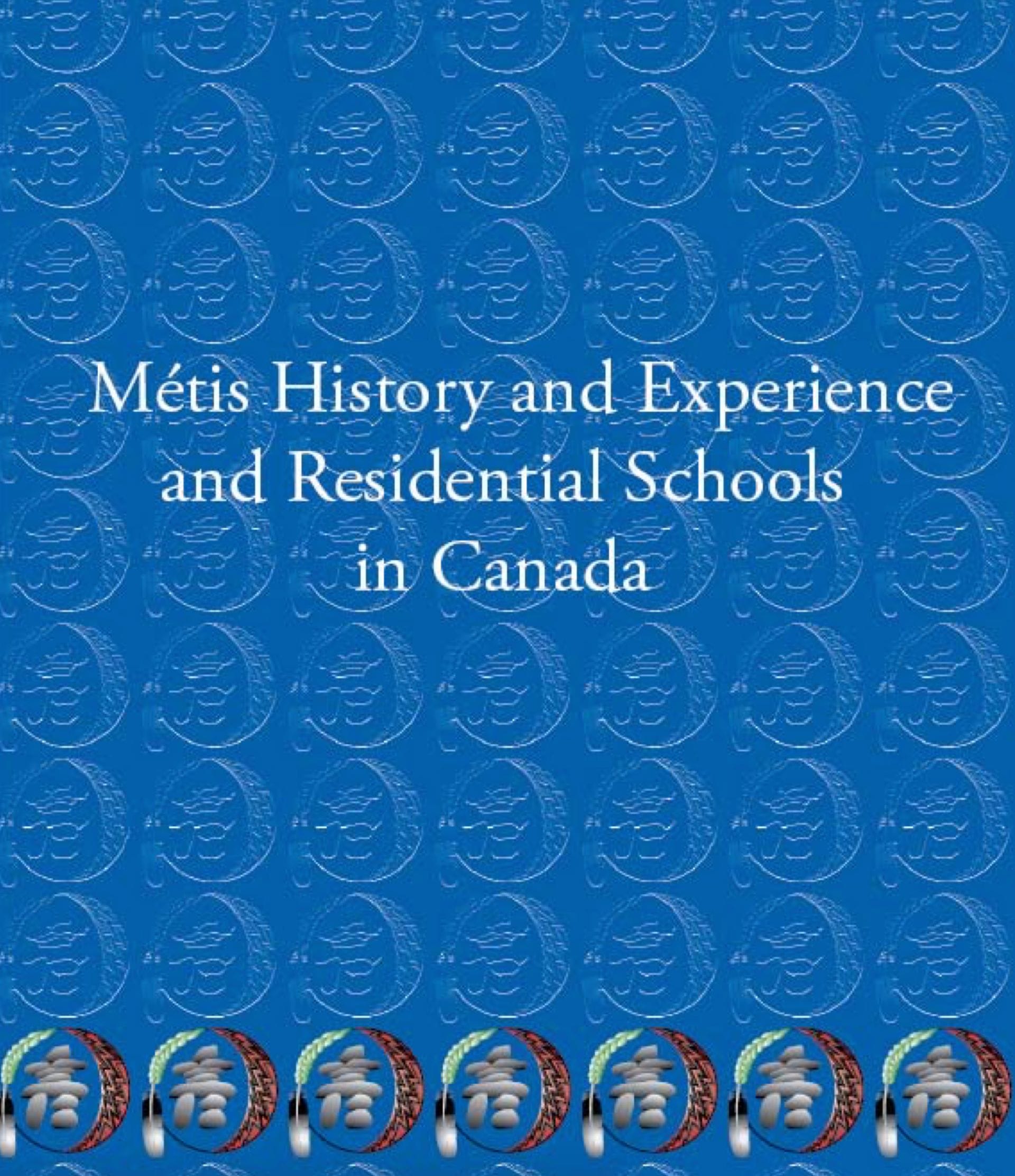
Métis History and Experience and Residential Schools in Canada (PDF)
A report foregrounding the experiences of Métis children in residential schools, and the issues they have faced and continue to face as a result.
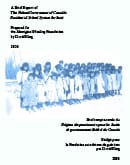
A Brief Report of the Federal Government of Canada's Residential School System for Inuit (PDF)
This report summarizes the federal government's involvement in Inuit education as reported by David King in an earlier report for the Aboriginal Healing Foundation.
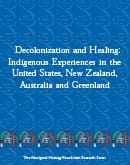
Decolonization and Healing: Indigenous Experiences in the United States, New Zealand, Australia and Greenland (PDF)
A study of Indigenous decolonization and healing in the United States, New Zealand, Australia and Greenland.
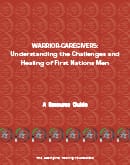
Warrior-Caregivers: Understanding the Challenges and Healing of First Nations Men (PDF)
Discusses issues relating particularly to men and the challenges they face as a result of their residential school experiences.

Aboriginal Domestic Violence in Canada (PDF)
This study looks at the contextual web relating to Aboriginal family violence advocating a framework for intervention that addresses root causes.
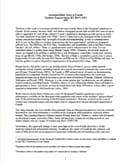
Aboriginal Elder Abuse in Canada (PDF)
This study looks at the issue of elder abuse among Aboriginal people in Canada.
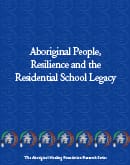
Aboriginal People, Resilience and the Residential School Legacy (PDF)
This report contains a critical analysis of resilience literature in the contexts of the cultures, lived experiences and larger social contexts of IRS Survivors.
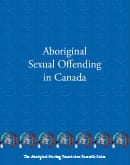
Aboriginal Sexual Offending in Canada (PDF)
This report looks at the unique circumstances that attend sexual offence issues for Aboriginal communities.
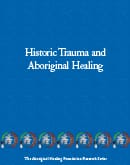
Historic Trauma and Aboriginal Healing (PDF)
This study puts forward a model for describing intergenerational transmission of historic trauma and the implications of this transmission.
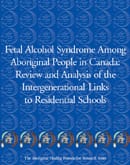
Fetal Alcohol Syndrome Among Aboriginal People in Canada: Review and Analysis of the Intergenerational Links to Residential Schools (PDF)
This report examines FAS in the context of the intergenerational effects of the residential school era.
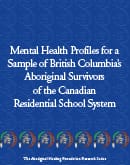
Mental Health Profiles for a sample of British Columbia's Aboriginal Survivors of the Canadian Residential School System (PDF)
This research report examines the abuse, mental health and health profiles of 127 Survivors through an analysis of their case files.
NCTR’s spirit name – bezhig miigwan, meaning “one feather”.
Bezhig miigwan calls upon us to see each Survivor coming to the NCTR as a single eagle feather and to show those Survivors the same respect and attention an eagle feather deserves. It also teaches we are all in this together — we are all one, connected, and it is vital to work together to achieve reconciliation.

